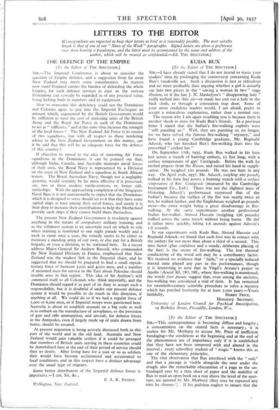LETTERS TO THE EDITOR
[Correspondents are requested to keep their letters as brief as is reasonably possible. The most suitable length is that of one of our " News of the Week" paragraphs. Signed letters are given a preference ever those bearing a pseudonym, and the latter must be accompanied by the name and address of the author, which will be treated as confidential.—Ed. THE SPECTATOR.] SIR,—The Imperial Conference is about to consider the question of Empire defence, and a suggestion from far away New Zealand may merit some consideration. As matters now stand England carries the burden of defending the whole Empire, for such defence services as exist in the oversea Dominions can scarcely be regarded as of any practical value, being lacking both in numbers and in equipment.
Now to overcome this deficiency could not the Dominions and Colonies agree to pay into the Imperial Exchequer an amount which, augmented by the British Government, would be sufficient to meet the cost of stationing units of the British Army and the Royal Air Force in each of the Dominions to act as " stiffeners," and at the same time increase the strength of the local forces ? The New Zealand Air Force is to consist of two squadrons, but with all respect to those tendering advice to the New Zealand Government on this matter, can it be said that this will be an adequate force for the defence of this country ?
If objection be raised to the idea of stationing Air Force squadrons in the Dominions, it can be pointed out that, although India, Canada, and Australia maintain naval forces of their own, the Royal Navy is represented by a Division on the coast of New Zealand and a squadron in South African waters. The Royal Australian Navy, though not a negligible quantity, would certainly be far more effective if it possessed, say, two or three modern battle-cruisers, or, better still, battleships. With the approaching completion of the Singapore Naval Base it is not unreasonable to expect that the Dominions which it is designed to serve should see to it that they have some capital ships at least among their naval forces, and surely it is their duty to increase their contributions to help the Motherland provide such ships if they cannot build them themselves.
The present New Zealand Government is resolutely against anything in the nature of compulsory military training, and as the volunteer system is an uncertain reed on which to rely when training is restricted to one night parade weekly and a week in camp once a year, the remedy seems to be either to maintain a standing army of our own, or else pay for a British brigade, or even a division, to be stationed here. In a recent address Major-General Sir Andrew Russell, who commanded the New Zealand Division in France, emphasised that New Zealand was the weakest link in the Imperial chain, and he suggested that we should be prepared to find a small expedi- tionary force of between 3,000 and 4,000 men, and a number of mounted men for service in the East about Palestine should trouble arise in that region. This idea of Sir Andrew's will • commend itself to all Colonials who think imperially, and the Dominion should regard it as part of its duty to accept such a responsibility, but it is doubtful if under our present defence system it would be possible to do much in this direction, if anything at all. We could do so if we had a regular force of 5,000 or 6,000 men, or if Imperial troops were garrisoned here. Australia is about to establish arsenals on a big scale as well as to embark on the manufacture of aeroplanes, so the provision of gun and rifle ammunition, and aircraft, for defence forces in the Antipodes, even if largely made up Of units drawn from home, should be assured.
At present migration is being actively discussed both in this part of the world and in the old land. Australia and New Zealand would gain valuable settlers if it could be arranged that members of British units serving in these countries could
be demobilised here at the end of their period of service should they so desire. After living here for a year or so as soldiers they would have become acclimatised and accustomed to local conditions, and in this respect have a distinct advantage over the usual type of migrant.
Some better distribution of the Imperial defence forces is imperative.—I am, Sir, &c., Wellington, New Zealand. E. A. K. SWINEY.


































































 Previous page
Previous page